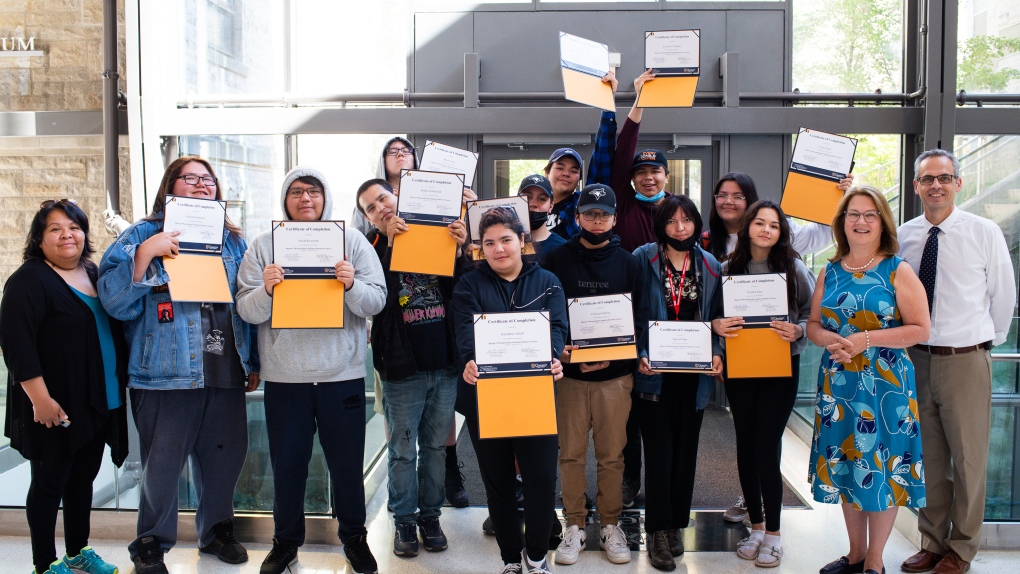New partnership aims to train Indigenous youth in health care
A new partnership between the Weeneebayko Area Health Authority (WAHA), Queen’s University and the Mastercard Foundation is aiming to provide more health-care education to Indigenous youth in the James and Hudson Bay areas to increase the number of health-care workers in the region.
Dubbing it the Queen’s Weeneebayko Health Education Program, the partners said in a news release Tuesday that it will focus on giving Indigenous students culturally appropriate schooling for careers in medicine, nursing, midwifery and other health professions.
The goal, officials said, is to address challenges in accessing health care in remote communities and have it be delivered by locally-trained workers.
"This is a very important initiative for the Weeneebayko Region that will help increase the capacity for culturally-safe health care that is directed and delivered by health professionals from our communities," said WAHA President and CEO Lynne Innes.
"It is exciting to work together on this new approach that will support Indigenous youth as they pursue health-care careers and build a stronger, healthier future for the communities we serve."
The Mastercard Foundation is providing over $31 million to fund the program as part of its larger promise to help educate 100,000 Indigenous people by 2030.
This comes after WAHA’s announcement in January that a planned health care complex in Moosonee is going forward and that it will need staffing—with a potential avenue of supplying those workers by training local Indigenous people.
The partners’ release said the various health care programs could start enrolling students by 2025 and educate as many as 240 students per year. That depends on how quickly they can put quality curricula, learning facilities and employment pathways in place.
Its curriculum will incorporate Indigenous traditional knowledge, focus on culturally-sensitive care and will include placement and recruitment in Far North communities, with the goal of long-term retention.
The goal is to establish a new training site in Moosonee.
High school students from the communities the Far North health authority serves took part in a week-long health sciences camp at Queen’s Kingston campus in August, to get them thinking about careers in the field. It is located next to the city’s general hospital, which regularly treats patients airlifted from the Far North.
 Indigenous students from communities served by the Weeneebayko Health Authority celebrate completing a Queen’s University health sciences summer course in Kingston Ont. in August, 2022. It was part of the soft launch of a partnership aiming to educate far north Indigenous youth to provide healthcare in northeastern Ont. (Supplied)
Indigenous students from communities served by the Weeneebayko Health Authority celebrate completing a Queen’s University health sciences summer course in Kingston Ont. in August, 2022. It was part of the soft launch of a partnership aiming to educate far north Indigenous youth to provide healthcare in northeastern Ont. (Supplied)
"This program will support Indigenous health transformation – improving regional health outcomes, addressing gaps in care delivery and building the Indigenous health workforce,” said Queen’s University’s Health Sciences Dean Jane Philpott.
"We look forward to building this dynamic educational model alongside the Weeneebayko Area Health Authority and local Indigenous leaders and we thank the Mastercard Foundation for supporting this crucial work."
CTVNews.ca Top Stories

W5 Investigates A 'ticking time bomb': Inside Syria's toughest prison holding accused high-ranking ISIS members
In the last of a three-part investigation, W5's Avery Haines was given rare access to a Syrian prison, where thousands of accused high-ranking ISIS members are being held.
'Mayday!': New details emerge after Boeing plane makes emergency landing at Mirabel airport
New details suggest that there were communication issues between the pilots of a charter flight and the control tower at Montreal's Mirabel airport when a Boeing 737 made an emergency landing on Wednesday.
BREAKING Supreme Court affirms constitutionality of B.C. law on opioid health costs recovery
Canada's top court has affirmed the constitutionality of a law that would allow British Columbia to pursue a class-action lawsuit against opioid providers on behalf of other provinces, the territories and the federal government.
Cucumbers sold in Ontario, other provinces recalled over possible salmonella contamination
A U.S. company is recalling cucumbers sold in Ontario and other Canadian provinces due to possible salmonella contamination.
Irregular sleep patterns may raise risk of heart attack and stroke, study suggests
Sleeping and waking up at different times is associated with an increased risk of heart attack and stroke, even for people who get the recommended amount of sleep, according to new research.
Real GDP per capita declines for 6th consecutive quarter, household savings rise
Statistics Canada says the economy grew at an annualized pace of one per cent during the third quarter, in line with economists' expectations.
Nick Cannon says he's seeking help for narcissistic personality disorder
Nick Cannon has spoken out about his recent diagnosis of narcissistic personality disorder, saying 'I need help.'
California man who went missing for 25 years found after sister sees his picture in the news
It’s a Thanksgiving miracle for one California family after a man who went missing in 1999 was found 25 years later when his sister saw a photo of him in an online article, authorities said.
As Australia bans social media for children, Quebec is paying close attention
As Australia moves to ban social media for children under 16, Quebec is debating whether to follow suit.

































